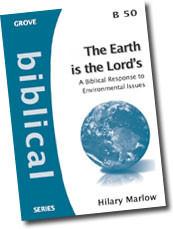
© Tomasz Proszek
‘The earth is the Lord’s and everything in it’
(Psalm 24:1)
What are the Biblical principles that can inform how we respond to the messages we hear, and the evidence we see, which tell us we are facing an environmental crisis? Hilary Marlow’s Grove Booklet introduces a number of themes from both the Old and New Testaments that inform the Church’s attitude to creation.
To begin with, there is the principle that God made all of creation in its wonderful diversity. He sustains and provides for everything he made, and has a plan and purpose for it. Creation reveals God’s glory, and praises him – inspiring us to do the same.
We are then invited to think about our own relationship with creation. Chapter 1-3 of Genesis lays out how we are called to rule, tending and keeping as God’s representatives on Earth, and describes the consequences for abdicating that responsibility. The Old Testament prophets had much to say about the consequences of people’s selfish behaviour for the land they lived in – and particularly the effect on the poor.
Marlow describes Jesus’ relationship to creation as creator and redeemer, as well as his use of examples from creation in much of his teaching. Ultimately, Jesus gives us hope – not just of a renewed heavens and earth in the future, but also for life here and now.
 This booklet is a great first read on a Christian approach to the environment, and includes some discussion questions and pointers to organisations that will help with practical responses.
This booklet is a great first read on a Christian approach to the environment, and includes some discussion questions and pointers to organisations that will help with practical responses.
Hilary Marlow, The Earth Is the Lord’s: A Biblical Response to Environmental Issues (Grove Books, 2008, £3.95, 28 pages).




